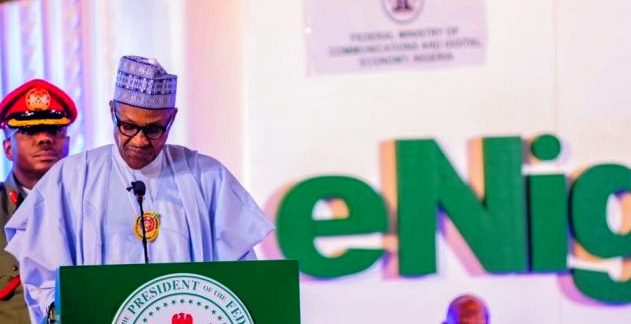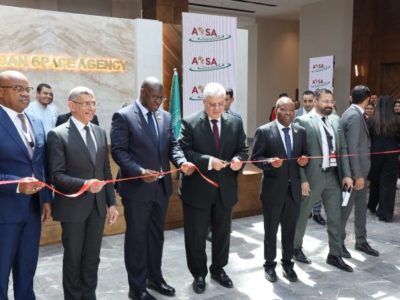By Nwakaego Alajemba, Abuja
The National Information Technology Development Agency (NITDA) has saved the Nigerian government over N16.8 billion through a more efficient procurement processes for ICT projects carried out by all ministries, department and agencies (MDAs) of the federal government, President Muhammadu Buhari revealed today as he officially declared open the e-Nigeria 2019 conference and also unveiled the National Digital Economy for Digital Nigeria roadmap.
“You will all recall that at e-Nigeria 2018 conference, we directed that all government funded ICT projects must be reviewed and cleared by National Information Technology Development Agency (NITDA). Our goal was to enhance the efficiency and effectiveness of government procurement processes. Today, I am informed that through this directive, government has saved over 16.8 billion Naira. I want to encourage the Ministry and NITDA to sustain this tempo,” said the president.
The president said his government recognises the continues growing impact of ICT to the country’s GDP.
“The second quarter report by the National Bureau of Statistics for 2019 showed that the Information and Communications Technology sector contributed an impressive 13.85% to the Gross Domestic Product (GDP) of Nigeria. This clearly shows the importance and potential of the ICT sector to our job creation and economic diversification agenda.”
The eNigeria event is the flagship conference of the NITDA. The chief host and convener for eNigeria 2019 is the Minister of Communications and Digital Economy, Dr Isa Ali Ibrahim Pantami while the event’s host and convener is NITDA’s Director-General/Chief Executive Officer, Mr. Kashifu Inuwa Abdullahi.
“Globally, the Digital Economy is expanding at a very fast pace. In just a few years, this platform has transitioned from being a luxury to an absolute necessity. It is in recognition of this fact that we decided to re-designate the Federal Ministry of Communications as the Federal Ministry of Communications and Digital Economy with a mandate to develop and implement a harmonized and well-coordinated digital economy policy and strategy for Nigeria,” added the president even as he emphasized that his administration remained committed to driving government processes through ICT.
His words: “Our recent introduction of the Nigerian E-government Masterplan will further consolidate our successes to date and increase interoperability among the different Ministries, Departments and Agencies of government.
“A key requirement of the E-government Masterplan is for all government institutions to create a Digital Transformation Technical Working Group that will work with the Ministry of Communications and Digital Economy to ensure seamless and coordinated implementation of projects, programs and policies.”
Below is full texts of the president’s speech.
Speech by His Excellency, Muhammadu Buhari, President, Federal Republic of Nigeria at the e-Nigeria 2019 Conference on the Nigerian Digital Economy. Thursday, 28th November 2019.
Protocols:
1. I am delighted to participate in this Opening Ceremony of the 2019 e-Nigeria Conference, Exhibition and Awards
2. Globally, the Digital Economy is expanding at a very fast pace. In just a few years, this platform has transitioned from being a luxury to an absolute necessity. It is in recognition of this fact that we decided to re-designate the Federal Ministry of Communications as the Federal Ministry of Communications and Digital Economy with a mandate to develop and implement a harmonized and well-coordinated digital economy policy and strategy for Nigeria.
3. The second quarter report by the National Bureau of Statistics for 2019 showed that the Information and Communications Technology sector contributed an impressive 13.85% to the Gross Domestic Product (GDP) of Nigeria. This clearly shows the importance and potential of the ICT sector to our job creation and economic diversification agenda
4. Already, Nigerian ICT startups are leaving their mark on the global stage. For example, at the Gulf Information Technology Exhibition (GITEX), a Nigerian Artificial Intelligence solution provider, Chiniki Guards, took first place, beating 750 contestants from 73 countries. We shall continue to encourage and support such digital entrepreneurs to develop innovative solutions for local and global challenges.
5. In public service, the digitisation of key activities such as the use of the Bank Verification Number (BVN), Treasury Single Account (TSA) and the Integrated Payroll and Personnel Information System (IPPIS) has enabled us to save cost and fight corruption.
6. Of course, as we celebrate the successes and explore the opportunities in this sector, we must remain mindful of its threats. We all know how the use of unregistered and improperly registered SIM cards by terrorists is a key national security threat.
7. Today, I am informed that over 9.2 million SIM cards have either been normalized, blocked or deactivated in less than 40 days due to improper registration. We encourage all Nigerians to ensure that their phones are properly registered. As a Government, our priority is to protect the lives and properties of all Nigerians.
8. Ladies and Gentlemen, you will all recall that at e-Nigeria 2018 conference, we directed that all government funded ICT projects must be reviewed and cleared by National Information Technology Development Agency (NITDA). Our goal was to enhance the efficiency and effectiveness of government procurement processes. Today, I am informed that through this directive, government has saved over 16.8 billion Naira. I want to encourage the Ministry and NITDA to sustain this tempo.
9. Our recent introduction of the Nigerian E-government Masterplan will further consolidate our successes to date and increase interoperability among the different Ministries, Departments and Agencies of government.
10. A key requirement of the E-government Masterplan is for all government institutions to create a Digital Transformation Technical Working Group that will work with the Ministry of Communications and Digital Economy to ensure seamless and coordinated implementation of projects, programs and policies.
11. Furthermore, the Nigerian e-Government Interoperability Framework, the Enterprise Architecture and the Nigeria Data Protection Regulation are in place and all Ministries, Departments and Agencies are expected to comply with these policies.
12. I have therefore directed the Federal Ministry of Communications and Digital Economy to develop training and sensitization programs that will be rolled out across all key MDAs with immediate effect to ensure seamless implementation of the masterplan.
13. I wish you very fruitful and impactful deliberations as I look forward to receiving a comprehensive report with your recommendations on how we can improve and expand Nigeria’s digitization agenda for the betterment of our country.
14. Thank you very much for your attention. I hereby declare this Conference open.
Cover Image: The Cable































